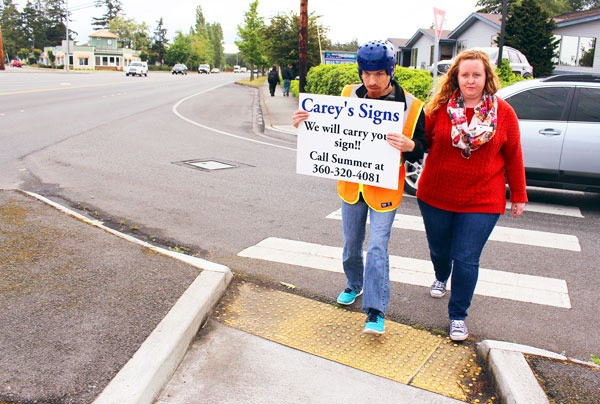A day at the office for Russell Carey looks like this: He’s driven to the intersection of Whidbey Avenue and State Highway 20 in Oak Harbor. He straps on a protective helmet, slips into an orange safety vest and grabs his moneymaker, a sturdy white sign that proclaims: “Carey’s Signs. We will carry your sign!!”
A caregiver holds his arm and they stroll up and down the highway.
This is his Microsoft. He has a business license from the city. He pays taxes. He keeps what he earns.
And he loves what he does.
Carey, 28, could walk all day. He’s a client of Service Alternatives, an organization that helps people with disabilities. Most of their clients need help getting a job. Carey is one of the few who takes advantage of help with housing and work.
For a moment Thursday at his Oak Harbor home, it seemed work might not happen. A cloudburst drenched the city, his companion thought it might be best to postpone, and a reporter made a comment on the possible cancellation. He rocked back and forth: “Bye-bye-bye-bye-bye!”
When things were set right, he was all grins.
His caregiver helped him get his shoes on and grab his sign. Once he hit the street, his happiness was contagious. He clutched the caregiver’s arm and made an accurate observation about the state of Oak Harbor traffic: “There’s lots of big trucks!”
Yes, his companion smiled, big trucks.
Carey is on his own. He was raised in foster care and is a graduate of Oak Harbor High School. If he has blood relatives, they are not a part of his life. He’s lived with his two roommates for nearly a decade in a low-slung house off Eighth Avenue. He pays his own rent. It’s not fancy, but it’s a tidy home filled with warmth and security.
Carey has his own room. His clothes are hung neatly in the closet, his bed is crisply made with a “Cars” bed spread and his favorite rocking-to-the-oldies CDs are stacked on his dresser. He likes game shows, bowling and eating mac-and-cheese from the blue box.
He and his roommates have 24-hour care.
Carey can do many things, but his caregivers provide direction. They help him get ready for the day, cook, do chores and work. Perhaps if life had dealt Carey different cards, he’d be a marathon runner. He loves to move. He sports a red wiry goatee and lean, distance-runner’s physique. When not walking with a sign, he’s strolling around Oak Harbor for pleasure until his caregivers give out.

“He’s an outgoing, very happy man,” said Lisa Quilico, a residential coordinator who cares for Carey. “He’s got a very good sense of humor. He loves to laugh.”
As Quilico spoke, Carey sat nearby on the floor and played with one of his favorite toys — a soft, flexible mirror. He stared at his reflection intently then set it down when Quilico mentioned how much Carey likes to walk.
“Uh-huh!” he said.
He leaned forward and planted a gentle kiss on her leg.
A few years ago, when the folks at Service Alternatives were looking for a job for Carey, he presented a bit of a challenge. They try to match a person’s skills and abilities with meaningful work. That might be office administration, janitorial work, delivering newspapers or food service, said Ashlee Wiley, a program manager for Service Alternatives.
In some cases, her clients get jobs that pay better than hers.
“Our job is to help them be tax-paying citizens just like everyone else,” she said. “We want them to be a part of the community and have a sense of purpose.”
Carey can’t work independently at any of those tasks. He’s living with autism, visual impairment and a brain lesion that causes seizures. What he loves to do is walk. He can’t stand still in one place long enough to wave a sign advertising pizzas or tax services.
He tried volunteering walking dogs but he wanted to keep walking beyond the confines of the dog shelter. So Wiley and her staff hit on the idea of him having do what is, in essence, his own advertising business.
He charges $80 for an initial contract. That includes the price of a custom sign — made at cost by Whidbey Signs — and one hour of advertisement for six weeks.
If customers want something different, that can be negotiated. If you’re interested in Carey’s services, call 360-320-4081.
He’s been at it several years. One of his steady clients is Clay Miller, a real estate agent who works out of the Windermere office in Coupeville.
Miller, who has a successful business, isn’t sure if advertising with Carey has led to any more houses sold.
But, Miller said, it’s led to name recognition for his business.
“I’ve had a lot of people stop me and comment on it or post photos to Facebook,” he said.
All of that is really beside the point. Miller said he believes in the inherent value of all people and the importance of work as something that makes all of us whole and healthy.
“I like the fact people are eager to work and want to make something of themselves,” he said.
He added he’d rather be paying Carey than handing a wad of cash to “the guy who sits outside Walmart.”


